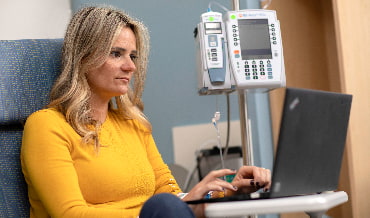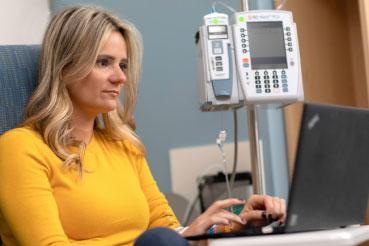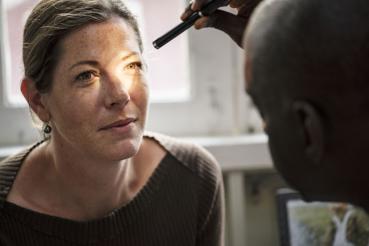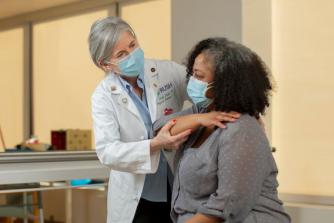Brain health means taking care of your brain to best support your physical, mental and social well-being through every stage of life.
When it comes to treating multiple sclerosis, or MS, and related neurological diseases, you and your family have many options. But that can make the decision-making process about your care overwhelming.
It can be even harder if you’re living with mobility or cognitive issues, fatigue, pain, mood problems or depression. You may feel that your quality of life isn’t what it should be.
The Rush Brain Health Program not only guides you through your MS care options but helps you learn and address your whole brain health.
The program delivers wellness care to the more than 3,000 people with MS who attend it at Rush. And it doesn’t just rely on neurologists. It brings a whole team — working together across many fields of medicine — to give you the care you need. The team includes experts in exercise, occupational and physical therapy, music therapy, nutrition and neuropsychology.
Your care plan is custom-made for you and includes medical treatment, psychological support and physical and cognitive rehabilitation.
It also gives you the power to take charge of your brain health through exercise and nutrition programs and educational sessions.
We understand that it can be hard to change your behaviors and modify your lifestyle. For that reason, our program's framework gives you the tools you need to make these meaningful changes and reach your best brain health.
The Rush Brain Health Program progresses as follows:
- Identifying the problem: You and your team will start by diagnosing and discovering what aspects of your health needs attention and care.
- Understanding the problem: You’ll learn about the six pillars of Brain Health through engaging educational sessions.
- Making changes: At the Rush Multiple Sclerosis Brain Health Center, you and your team will make positive changes with your custom care plan. These will include lifestyle changes that aim to improve your brain health.
- Checking on your progress: Your care team will monitor your progress and make sure your care plan is working for you.
- Keeping up the progress: You and your team will form a plan to keep up the changes you’ve made in a way that you’re comfortable with. You’ll be able to continue your education with activities that include monthly webinars on brain health and in-person events.
Once you’ve gone through the program, you and your team will identify any other brain health issues you may have, and steps of the process can start again as needed.
Identifying Brain Health Problems
When you set up your appointment at Rush, you’ll have an in-person assessment of your brain health. Your care team will evaluate your physical, emotional and mental well-being and take some baseline measures so they can monitor your progress.
After your assessment, you’ll be enrolled in an education program to learn more about your brain health through independent studies and virtual group learning sessions.
Understanding Your Brain Health
The Brain Health Program offers you a two-week learning experience referred to as the Brain Health Masterclass for MS. This learning experience involves three live virtual group sessions each week. These sessions are free with enrollment in the program.
Before your group sessions, you’ll do some independent learning with a few prerecorded videos. These videos break down complex topics in an easy-to-understand way.
The virtual sessions happen over Microsoft Teams and last from an hour to an hour and a half, starting at 6 p.m. CT. During these sessions, you’ll review the main concepts from your independent study. You’ll be able to ask questions and clarify anything you may still be wondering about. You’ll also have a chance to meet other patients and health care providers.
The timeline and subjects you’ll cover during your virtual sessions are as follows:
- Day One:
- Risk Factors, Epidemiology and Diagnosis of MS
- Role of Disease-Modifying Therapies
- Day Two:
- Understanding Cognition in MS: The Role of Neuropsychology
- Behavioral Strategies for Cognition: Set Yourself up for Success!
- Day Three:
- The Role of Physical Therapy for Optimizing Brain Health in MS
- Occupational Therapy: Managing MS-Related Fatigue and Sleep Hygiene
- Day Four:
- Music Therapy: Fun & Easy Strategies to Integrate into Your Life
- Practical Approaches to Living with MS
- Day Five:
- Healthy Aging: The Role of Diet on the Maintenance of Brain Health in MS
- Day Six:
- Symptom Management
- Brain Reserve & Brain Health: Putting it All Together
After you’ve completed your education, you’ll get a post-program survey in your email. Your feedback will help improve the program for yourself and future patients.
Register for Brain Health Masterclass for MS Education Sessions
Making Changes for Your Brain Health
Once you’ve learned about your brain health, it will be time to make some changes. Your care team will create a custom plan to address any problems they've identified.
You can take your care plan back to your usual Rush health care provider even if you choose not to pursue treatment through the Brain Health Program. But your care team will stay involved in your wellness via virtual telehealth services. You’ll have access to the team’s publications and web-based group care.
Your care plan will focus on the following:
- Nutrition
- Physical wellness
- Cognition and social behavior
- Emotional and symptom management
- Addressing other conditions or risks that affect your brain health
MS can affect more than your brain health. For example, you may have a more sedentary lifestyle, a higher risk of falls and accidents or higher heart and vascular risks.
The care plan will take all of these into account to address your overall wellness. It will provide nutrition counseling, physical and psychological assessments, dietary support, rehabilitation and personal exercise programs and health monitoring resources.
You’ll also have access to in-person and telehealth interventions lead by professionals to help support you in making these changes in your life meaningful and sustainable.
Checking Your Brain Health Progress
Once you’ve started your care plan, your team can keep track of your progress with remote exercise and activity monitors and measures of your body mass index, blood pressure and lipid profiles. The team can give you ongoing wellness assessments and gather data to improve the program.
They team will also run tests to measure the following:
- Your levels of fatigue
- Any problems with your motor skills, vision, learning ability or mental abilities
- Any disabilities you report
- Your levels of depression and anxiety
- Your mobility and leg function
- Results from an app you can use to track your symptoms and mood
- Changes in myelin lesions in the brain that cause MS symptoms
- Injury or loss in neurons
- Inflammation
By comparing your test results to the baseline measures from your early visits, the team can find out how well your care plan is working for you. They can also make any needed changes to improve your health.
Keeping up the Progress
Your care team will help you continue with any health changes you’ve made, and you’ll have the opportunity to continue your education with ongoing activities.
One of these activities is our “Conversations on Brain Health” webinars.
Sign up for monthly Conversations on Brain Health sessions
These are one-hour virtual education sessions that cover a range of topics, such as age-related cognitive decline, neuronal plasticity and repair mechanisms of the brain, and evidence-based research.
“Learning about a diet that works best for those of us living with MS has been very useful! I’ve already begun to incorporate more grains into my diet, especially oatmeal at breakfast. I’d love to continue learning, as this community understands MS and all that comes along with it. I’m truly grateful to have found you guys!"
The goal is to explain these topics in ways that any patient can understand and empower you and your loved ones with knowledge about MS. You’ll learn how to apply findings from the latest news and medical journal articles to your life and improve your brain health.
You can join for free, and the sessions are open for anyone to attend. You don’t need to be a current Rush MS patient.
Sessions occur virtually on the second Monday of every month from 6 to 7 p.m. CT via Webex. There will also be some in-person events to attend, which you will be notified of when you sign up.
Nutrition and the MIND Diet
Foot Drop, Walking Impairment, Neuromodulation Devices and More
Rush Excellence in Brain Health
- Convenience: Much of patients' care, monitoring and learning can be done virtually. This reduces the need for travel and in-person visits, which can be especially helpful for patients having mobility issues or other impairments that make it difficult to come in for frequent appointments.
- Empowering patients: Through learning sessions and activities, patients can expect to feel more confident in their understanding of brain health, MS and related conditions and their progression. They’ll also have a better understanding of treatments and lifestyle changes that can improve their brain health.
- Always improving: By monitoring patients’ progress, physicians can test, track, share and learn from their outcomes and measure the impact of the program. This scientific data helps improve the program and make it the best it can be.
- Highly ranked care: U.S. News & World Report includes Rush on its Best Hospitals Honor Roll and ranks our neurology program among the best in the nation.








